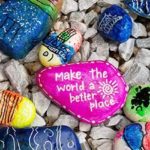Everyone has a story. A story that impacted our lives, that equipped us with skills we largely overlook or downplay, yet these moments have a huge impact that shape us and our journey in life.
These moments that shape us can be things such as: death, divorce, becoming a parent, moving countries, a critical illness or a near death experience such as a car accident or similar. It’s those moments that invite us to stop, sit up, pay attention, and take stock of our life, it’s meaning and purpose.
Going through experiences like this can feel like we’re riding an emotional roller coaster, continuous ups and downs, where some days we feel like we have a grip on things, and other days it can feel like we are stuck in a deep dark pit with no way out.
When we’re in the thick of it, we experience emotions such as overwhelm, indecision, anxiety, nervousness, apprehension, fear, frustration, numbness and more. These emotions can also impact our health and well-being as being in distress (a state of stress) can lower our immune system, it can affect our sleeping and eating patterns, and we can lash out at those closest to us.
It’s only once we’ve passed through these life defining moments and look back, that we can see the influence these moments have had on our lives and the lessons and skills we have gained from the experience. Being able to identify both the positives, and the insights (or life’s lessons) is of great benefit to our growth and journey in life.
These insights equip us with essential life skills such as the ability to:
- deal with and overcome adversity
- problem-solve
- develop analytical thinking skills
- improve our decision making skills
- navigate change and uncertainty
- build our resilience
- develop self-leadership and self-discipline traits
- develop our self-awareness and emotional intelligence
Life changing moments are there to define us and shape us into being the very best versions of ourselves. They come along to push us into learning things about ourselves, how to deal with situations, other people and how to respond in a rational and logical way vs. becoming reactive and defensive.
However, in order to do this, we have to be open to sitting in the uncomfortable space whilst being willing to explore our inner being at the same time. We can choose to see the negatives and slip into blame or victim roles or we can choose to see the insights and opportunities.
“When you blame others, you give up your power to change.” – Dr. Robert Anthony
Blame is a victim mindset, not an empowered mindset.
Blame mode – when we are in this frame of mind we tend to blame everything and everyone else as to why things didn’t happen, why we couldn’t do something, go somewhere, achieve our goals, get the results we wanted and more.
Victim mode – when we are in this frame of mind, we fall prey to finding every reason and excuse as to why things keep happening to us, why things keep going wrong in our lives, that everything and everyone is out there to get us, we question what we did to deserve all of this and if only someone would just give us a break.
What we don’t realise when we are in blame or victim mode is that it always comes back to self:
V I C T I’M B L A M E
- When we blame other things or people for what has gone wrong in our lives, what we don’t realise is that the last two letters of the word blame is: ME.
- When we blame, we avoid taking accountability and responsibility for our contribution to the situation.
- When we play victim, the last two letters are: I’M. The only one keeping you in victim mode is you.
No one can make you feel anything or do anything against your will, you allow it to happen. You put yourself in blame and victim mode in various ways – not speaking up, not having boundaries, not living your truth, and only you can get yourself out of this mindset. You hold the power to get out by taking action instead of giving in, giving up or accepting the status quo.
We always co-create situations by how we react, our mind-set (positive or negative), our emotional state (positive or negative) and our intentions or agendas. How you choose to let the situation shape you and your experiences in life is totally up to you.
So, the next time you are going through a challenging time in your life, it may feel like you are being stretched in all directions but actually, you’re going through a growth spurt, and developing very real skills that will help shape you for the next challenge that is bound to show up further down the line.
Your past does not get to define you – You do.
Paula Quinsee: Relationship Expert and passionate advocate for creating healthy relationships at home, in the workplace, and against GBV, to co-create a more human connected world and positively impact people’s lives. Paula is also an international speaker and author of Embracing Conflict and Embracing No. More info: https://paulaquinsee.com/








